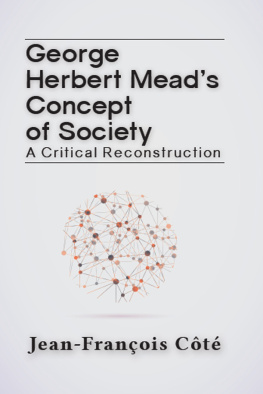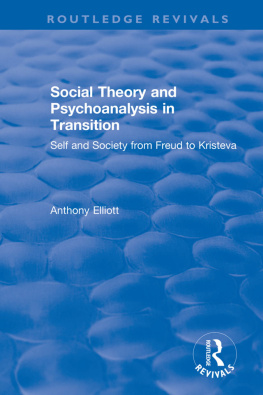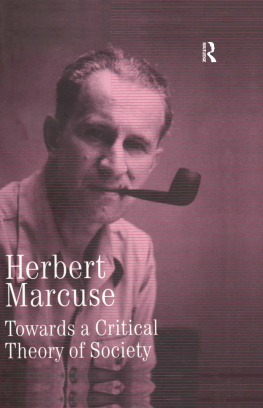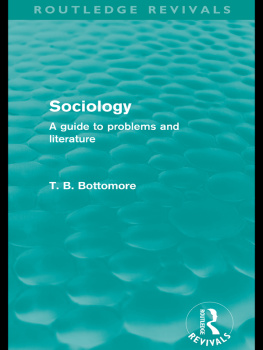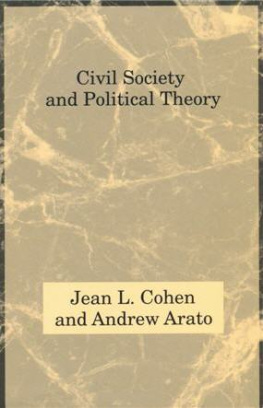First published 2015 by Paradigm Publishers
Published 2016 by Routledge
2 Park Square, Milton Park, Abingdon, Oxon OX14 4RN
711 Third Avenue, New York, NY 10017, USA
Routledge is an imprint of the Taylor & Francis Group, an informa business
Copyright 2015, Taylor & Francis.
All rights reserved. No part of this book may be reprinted or reproduced or utilised in any form or by any electronic, mechanical, or other means, now known or hereafter invented, including photocopying and recording, or in any information storage or retrieval system, without permission in writing from the publishers.
Notice:
Product or corporate names may be trademarks or registered trademarks, and are used only for identification and explanation without intent to infringe.
Library of Congress Cataloging-in-Publication Data
Ct, Jean-Franois, 1959
George Herbert Meads concept of society : a critical reconstruction / Jean-Franois Ct.
pages cm
Includes bibliographical references and index.
ISBN 978-1-61205-804-7 (hardcover : alk. paper)
ISBN 978-1-315-63451-7 (eBook)
1. Social psychology. 2. Self. 3. Mead, George Herbert, 18631931Political and social views. I. Title.
HM1033.C68 2014
302dc23
2014026629
ISBN 13: 978-1-61205-804-7 (hbk)
ISBN 13: 978-1-61205-805-4 (pbk)
This book is about George Herbert Meads concept of society. Although Meads theory of the self has attracted a lot of attention among sociologists and philosophers throughout the twentieth and early twenty-first centuries, almost no one has paid serious attention to his ideas on society. This is surprising, since his theory of the self involves an explicit link to his concept of society; among the three components of his theory of the self (Self, I, Me) is an element internal to the individual (Me) explicitly defined in one form or another as the organized set of attitudes of others which one himself assumes.1 Yet if the organization of the relations to others is an integral part of the self, how is it structurednot only with respect to the self, but also with respect to itself? There are several ways that Mead defines others: as individuals; the generalized other, as he often refers to the category that goes beyond particular individuals; community, social organization, social process or sociality, and finally society are also categories that exist for the self, as they are part of it, as much as the self is part of them. All are terms and categories that have to be understood in relation to one another, but how? These questions do not have easy answers, mainly because Mead himself was not always completely explicit, or entirely without ambiguity, when he dealt with these matters. His first concern, after he positioned himself toward a reformist definition of the social order during his early intellectual formation, was related to the development of a social psychology. While he could have simply set aside considerations of society, his position in fact ran directly against such an assumption, as we can ascertain when he identified, quite late in his career, a principle that he had employed from the very beginning: For social psychology, the whole (society) is prior to the part (the individual), not the part to the whole; and the part is explained in terms of the whole, not the whole in terms of the part or parts.2 Understanding what Mead meant when he referred to society as a central category of his theoretical endeavor, which seems so essential in such a statement, requires an interpretation that considers how this notion can be defined according to the whole of his social psychological theory and philosophical reflection. Only then will we be able to consider the concept of society as fundamental to his sociological understanding of the selfor any other aspect of Meads theoretical views. To do so, and in order to clarify what can sometimes appear as relatively ambiguous in his work, we must then undertake a theoretical reconstruction of Meads concept of society.
The reconstruction that follows adheres as closely as possible to Meads texts, and will be done according to a systematic interpretation of the concept of society, based first on the chronological genealogy of its development in Meads writings. In , I propose to follow Meads indications on the main categories that he used and developed, in such a way that we can understand both their respective place in his theory and the dynamics at stake within and among them. Indeed, if there is something striking about Meads theoretical views in general, it is that they involve a movement of codetermination of things; that is, they involve mutual and respective developments linking, for example, individuals and institutions in society, or the I and the Me in the Self, both logically and in social reality, as categories that are distinct but still have to be considered togetheralmost organically. One easy way of relating to this movement of codetermination is to define it through the evolutionary perspective that Mead adopted, according to which any given reality in human society has been produced by its own evolution (or self-evolution), as a natural phenomenon (that is, as a relation between an organism and its environment). Another, perhaps more difficult, way to consider this movement is to situate Mead in relation to Hegelian philosophy, a path that, even though more abstract in appearance, is nonetheless fully justified by Meads long-term engagement with G. W. F. Hegel, mainly through his teachings from the early twentieth century to his retirement from the University of Chicago in 1931. While this latter path will be followed here because it helps to situate Meads concept of society within its own originality (and with respect to both Hegels concept of society and other sociological concepts that have been developed since Mead), we will not lose sight of the other, naturalist perspective he adopted, since this was after all the point of view of the more general and fundamental critique that pragmatism addressed to Hegels philosophy. What is required here is the identification of the main categories involved in Meads concept of society that have developed as part of his naturalist social psychology, as well as an understanding of their mutual relations engaged in a dialectical process (that is, oppositions situated by their mutual and reciprocal relations, together with their mediations). This is how society is finally considered as a self-transformable entity, which has to be understood according to an evolutionary perspective of self-development, but at the same time offers the possibility of consciously envisioning such a self-development through a specific creation: an institution that allows for this self-transformation to occur, or as Mead would put it, an institution that has internalized the revolutionary principle into its core institution, which is represented by a political constitution.
The main categories related to the concept of society are considered through the gradual development of Meads theorization as it is presented in the numerous articles he wrote from the early twentieth century on, together with some additions that appear in his posthumous books. This will highlight the composition of the concept of society, and simultaneously lead us to examine the relation between the phylogenetic and the ontogenetic processes at work in the development of both society and self, which is the focus of . Here we will evaluate these two processes at work in Meads theorization using a comparison with Freudian psychoanalysis, which represents a parallel attempt at the redefinition of consciousness that involves the presence of the unconscious; in fact, we will see how both Sigmund Freud and Mead explain the genesis of consciousness (the ontogenetic process) through the presence of the unconsciousalthough their respective definitions differ in many ways. For Mead, indeed, this ontogenetic process cannot be understood without its counterpart in the evolution of society (the phylogenetic process). The dynamic involved here, taking into account the spatiotemporal dimensions of Meads later reflections, will help us to understand the dialectical process at the core of his evolutionary scheme, which allows for the development of self-consciousnessan explicit reference to the Hegelian legacy in his own theoretical enterpriseand of self-conscious society. The development of self-consciousness, applied to both the self and society, is truly central for Meads theoretical views. And while this has generally been acknowledged among those interested in Meads theory of the self, I intend to show how self-consciousness also requires for its own development a specific treatment of society. In other words, self-consciousness for Mead is not only, and not even primarily, an individual issue, but rather a societal one; it is only at a certain historical point in its self-development that a society requires the universality of self-conscious individuals for its development, that is to say, reaching every single individual through the principle of their self-conscious participation in human society. This can be expressed more simply by saying that we are situating this development in terms of universal citizenship, particularly as it develops within mass democracy, which is a model of political participation that Mead fully experienced in the United States and used as both an implicit and explicit reference in his theories. This model was fundamentally different from the modern bourgeois democracy that had developed in the course of European modernity, because mass democracy involved no restrictions on participation in the political process (i.e., it involved all individuals, women and minorities included, without the typical restrictions of bourgeois democracy centered on white men who owned property). It is this specific definition of society that is at work in Meads theorization, and while it has been linked to his political philosophy of radical democracy, it also has theoretical implications that will be demonstrated here through reference to the phylogenetic and ontogenetic processes identified.

